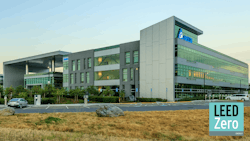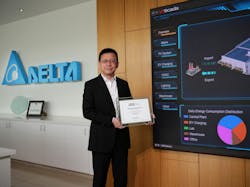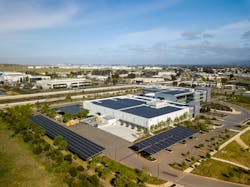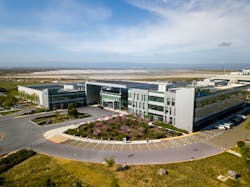New Tech Headquarters Becomes the First LEED Zero Energy-Certified Green Building in Fremont, CA
Innovation is at the heart of the tech industry, so when IoT-based smart green solutions provider, Delta, designed its Fremont, California, headquarters in 2018, it knew it had to go above and beyond. It had to target zero energy—and that’s exactly what it accomplished with recent technology upgrades to its already sustainable facility.
The company’s regional headquarters recently became the first green building in Fremont, and second in the Silicon Valley Bay Area, to achieve the LEED Zero Energy certification from the U.S. Green Building Council. The accolade, granted to green buildings that generate as much electricity as they consume, was attained thanks to the further implementation of Delta’s own solutions in this originally LEED Platinum facility.
Aided by an energy-conscious design that utilizes geographical advantages unique to Fremont while considering the productivity and needs of its operations, the Delta Americas HQ building is an example of what a total integrated solution can look like.
By focusing on energy conservation in information and communications technology (ICT) infrastructure, buildings and factories, and by developing smart energy solutions (renewable energy, energy storage, EV charging) Delta aims to reduce carbon emissions and contribute to a sustainable future—starting with its own facilities.
“The LEED Net Zero Energy-certified Fremont green building represents the pinnacle of these efforts and demonstrates Delta’s dedication to fulfilling its environmental protection goals,” Huang said. “By achieving net zero energy capabilities in its Americas headquarters, Delta can further support initiatives like its own RE100 goal—that is, to power its global operations with renewable electricity sources by 2030.”
With 32 green buildings enabled worldwide, Delta’s solutions are literally helping to create more sustainable cities and reach its aggressive climate goals.
Upgrades That Make the Grade—and Cut Costs
“Currently, our daily energy consumption is around 4,000 kWh, and the expected price per kWh from the utility provider is $0.18,” Huang explained. “Without the implementation of solar panels, our annual electricity bill would amount to approximately $263,000.”
To achieve these cost savings and further contribute to our sustainable goals, Delta invested in a comprehensive solar energy solution that covers nearly the entire area of the 180,000-square-foot facility at a total cost of approximately $1.5 million. The investment has already yielded a return on investment as the initial costs have been recouped after six years of the building’s construction, according to Huang. The energy savings generated by solar panels gradually offset the upfront costs, resulting in significant cost savings in the long run, he added.
“It’s important to note that the financial benefits extend beyond the payback period,” Huang continued. “By generating renewable energy on-site, we continue to reduce our reliance on the grid, lower electricity costs and contribute to a greener and more sustainable future.”
Optimized energy management is also attained by the implementation of Delta’s next-generation SCADA system and building control platform. These platforms integrate seamlessly with the existing building sub-systems, such as HVAC, LED lighting and other energy-intensive applications, to create set points, collect data and track trends, create reports and manage alarms, remotely. With unlimited scalability, this solution grows with the facility as new solutions are integrated to ensure lower energy consumption.
Green by Design
HVAC. Host to one of the largest geothermal systems in Silicon Valley, Delta’s unique location in the Bay Area takes advantage of the natural underground warm springs. With over 20 miles of horizontal piping at 15- and 30-foot depths, a Delta VFD circulates water in a closed-loop system to exchange heat for an HVAC system estimated to be 70% more efficient than a cooling tower.
Nearly 92 miles of piping is embedded in the facility’s floors and ceilings for radiant heating and cooling, providing stable and comfortable temperatures, efficiently. Working in collaboration with the Center for the Built Environment (CBE) at the University of California, Berkeley, this system has been a case study to determine optimal operations and controls for maximum energy efficiency.
Lighting. With LED lighting systems in the parking lot and around the office, Delta’s lighting controls integrates with its building management system to ensure smooth operations at all hours. Taking advantage of the floor-to ceiling panoramic windows, the open floor plan and low-e windows, zones are created to minimize waste from excessive lighting. Light meters placed around the office ensure sufficient light levels for safety and productivity.
Positive and Sustainable Change for the Future
The project sends a powerful message to building owners, managers and architects about the crucial role of sustainability in commercial real estate (CRE). “As we, Delta, have created 32 green buildings worldwide and continue to build more, both through new constructions and retrofits, our aim is to demonstrate to the industry the significant contributions that green buildings make toward sustainability,” Huang said. “These buildings serve as concrete evidence of the substantial reduction in CO2 emissions and electricity costs that can be achieved.”
The company’s Fremont project emphasizes that sustainability in CRE is not only attainable but also economically viable and beneficial in the long run. “We want to inspire building owners, managers and architects to recognize the potential of incorporating sustainable design and technologies into their projects,” Huang said. By gradually implementing upgrades in existing buildings such as LED lighting, automation for HVAC, lighting, shades, and improvements in indoor air quality (IAQ), solar PV, and energy storage systems (ESS), the path to sustainability becomes more feasible and manageable, he added.
“We aim to foster a mindset shift where sustainable practices are considered fundamental rather than optional,” Huang concluded. “Together, we can drive significant positive change and create a built environment that aligns with our shared vision of a more sustainable and environmentally conscious future.”




